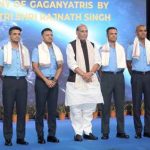The Partition of India in 1947 was one of the most tragic events in modern history. While independence brought freedom, it also created a deep wound — the birth of India and Pakistan. This division claimed the lives of at least 6 lakh people, displaced 1.5 crore refugees, and unleashed a wave of communal violence, sexual atrocities, and psychological trauma.
To honor those who suffered, Prime Minister Narendra Modi announced in 2021 that 14th August will be observed annually as Partition Horrors Remembrance Day.
Partition Horrors Remembrance Day
Partition was not caused by a foreign invasion or civil war. Instead, it was a political decision with catastrophic humanitarian consequences.
- Death Toll: At least 600,000 killed in communal riots.
- Displacement: Around 15 million forced migration across new borders — the largest in human history not caused by natural disaster.
- Social Trauma: Generations carried the scars of violence, uprooted families, and loss of dignity.
- Security Burden: India inherited hostile borders, Kashmir dispute, and repeated wars with Pakistan.
As philosopher George Santayana warned: “Those who cannot remember the past are condemned to repeat it.”
Forms of Partition Horrors
- Massacres
Entire trains carrying refugees arrived at stations filled only with corpses. Villages were wiped out in communal frenzy.
- Displacement
1.5 crore people crossed borders — Hindus and Sikhs moved from Pakistan, Muslims moved into Pakistan. Many never regained stability or peace.
- Atrocities on Women
Women were abducted, raped, and killed. In several places, they chose suicide by jumping into wells to preserve their dignity.
- Political Violence
From Noakhali riots (1946) to Direct Action Day (16 August 1946), the Muslim League used violence to pressurize British and Congress leaders.
- Psychological Trauma
Survivors lived with fear, suspicion, and emotional wounds. The collective memory of Partition shaped politics and society for decades.
Causes of Partition
The NCERT module identifies three main culprits:
- Jinnah – demanded Pakistan based on the Two-Nation Theory.
- Congress – reluctantly accepted Partition to avoid civil war.
- Mountbatten – hastily executed the division, advancing the transfer of power.
Key Events Leading to Partition
- 1938 – Hindu Mahasabha convention proposed separate Hindu-Muslim existence (as per Congress claim).
- 1940 Lahore Resolution – Muslim League demanded a separate homeland.
- 1942 Cripps Mission – Dominion Status rejected by Congress.
- 1946 Cabinet Mission – Proposed federation with three groups of provinces, failed after Congress withdrawal.
- 1946 Direct Action Day – Calcutta riots killed ~6000, escalating communal divisions.
- 1947 Mountbatten Plan – Announced Partition and princely states’ choice of accession.
Voices from History
- Lord Wavell: Partition would “increase bitterness”.
- Sardar Patel: Partition was a “bitter medicine to avoid civil war”.
- Jawaharlal Nehru: “Partition is bad, but civil war would be worse.”
- Mahatma Gandhi: Accepted Partition reluctantly, against his personal advice.
- Mountbatten: Admitted haste, but blamed Indians for violence.
- Sri Aurobindo: Considered Partition a “temporary dismemberment” that must be undone.
Consequences of Partition
Immediate Losses (1947–50)
- National Security: India now bordered hostile Pakistan on two sides.
- Social Breakdown: Mass killings, forced conversions, and loss of trust between Hindus, Muslims, and Sikhs.
- Economic Disruption: Prosperous provinces like Punjab and Bengal were divided, Kashmir’s position destabilized.
Long-Term Losses
- Kashmir Conflict – Sparked wars in 1947, 1965, 1971, and insurgency from the 1990s.
- Communal Politics – Despite Partition, communal suspicion and violence persist.
- Foreign Policy Burden – Global powers exploit Indo-Pak rivalry to pressure India.
Was Partition Inevitable?
Historians argue it was not.
- Nirad C. Chaudhuri wrote that even in late 1946, nobody believed Partition would happen so soon.
- Jinnah himself admitted he never expected Pakistan in his lifetime.
- Many Muslim League leaders viewed the demand as a bargaining tool, not reality.
Yet, Congress leaders, alarmed by escalating violence, gave in — making Partition appear like a “lesser evil” compared to civil war.
Political Debate Over Partition Narratives
The 2025 NCERT module triggered controversy by blaming Jinnah, Congress, and Mountbatten equally.
- Congress claims NCERT distorts history, arguing the Hindu Mahasabha first proposed separation in 1938, followed by the Muslim League in 1940.
- Leaders like Manish Tewari highlighted that the two-nation theory had supporters on both Hindu and Muslim sides across decades.
- Thus, Partition cannot be explained by one-sided blame but by a complex interplay of ideologies, violence, and leadership failures.
For UPSC aspirants, this teaches the importance of multi-perspective analysis in Mains answers.
Lessons from Partition
Both NCERT modules highlight enduring lessons:
- Reject Communal Politics – Special privileges for any community weaken unity.
- Leadership Matters – Shortsighted or arrogant leaders can cause national disasters.
- Realistic Politics – Governance must consider human emotions: fear, greed, anger, and vengeance.
- Preserve True History – Whitewashing or exaggerating history misguides future generations.
JPSC/UPSC Relevance
Prelims
- Direct Action Day – 16 August 1946
- Mountbatten Plan – 3 June 1947
- Radcliffe Award – 17 August 1947
- Partition Horrors Remembrance Day – 14 August
Mains
- GS I: “Discuss the causes and consequences of Partition of India.”
- GS II: “Communalism and its impact on national integration.”
- Essay: “Lessons from Partition: Unity and Diversity in India.”
Conclusion
The Partition of 1947 was more than a political decision — it was a civilizational rupture that continues to shape India’s security, society, and politics. Observing Partition Horrors Remembrance Day is not just about honoring victims but also about reminding citizens and future leaders of the dangers of communal politics and hasty decisions.
Raja Ram Mohan Roy’s Incredible 5 Contributions That Changed India
📝 MCQ Set on Partition Horrors Remembrance Day
Q1. Partition Horrors Remembrance Day is observed every year on:
a) 15th August
b) 14th August
c) 16th August
d) 3rd June
Answer: b) 14th August
👉 Announced by PM Narendra Modi in 2021.
Q2. Which of the following events is directly associated with the Muslim League’s “Direct Action Day”?
a) Quit India Movement, 1942
b) Cripps Mission, 1942
c) Calcutta Killings, 1946
d) Cabinet Mission Plan, 1946
Answer: c) Calcutta Killings, 1946
👉 Around 6000 killed in riots during “Direct Action Day”.
Q3. Who among the following was the Chairman of the Boundary Commission in 1947?
a) Lord Wavell
b) Lord Mountbatten
c) Cyril Radcliffe
d) Clement Attlee
Answer: c) Cyril Radcliffe.
Q4. Which of the following correctly lists the ‘three actors’ held responsible for Partition in NCERT’s Partition Horrors module?
a) Jinnah, Congress, Mountbatten
b) Jinnah, Gandhi, Radcliffe
c) Nehru, Jinnah, Wavell
d) Gandhi, Patel, Mountbatten
Answer: a) Jinnah, Congress, Mountbatten.
Q5. Which of the following provinces were most affected by Partition?
a) Punjab and Bengal
b) Sindh and Kashmir
c) Bihar and Odisha
d) Assam and Kerala
Answer: a) Punjab and Bengal.
Q6. Which Congress leader described Partition as a “bitter medicine” to avoid civil war?
a) Jawaharlal Nehru
b) Sardar Vallabhbhai Patel
c) Maulana Azad
d) Subhas Chandra Bose
Answer: b) Sardar Vallabhbhai Patel.
Q7. Which of the following statements about Partition Horrors is/are correct?
-
Around 6 lakh people were killed.
-
Nearly 1.5 crore people were displaced.
-
Partition was caused by a foreign invasion.
Options:
a) 1 and 2 only
b) 1 and 3 only
c) 2 and 3 only
d) 1, 2, and 3
Answer: a) 1 and 2 only.
Q8. The Lahore Resolution (1940) is historically significant because:
a) It rejected the British Cabinet Mission proposal.
b) It demanded a separate homeland for Muslims.
c) It endorsed Dominion Status for India.
d) It was signed between Gandhi and Jinnah.
Answer: b) It demanded a separate homeland for Muslims.
Q9. Who among the following described Partition as only a “temporary dismemberment” that must be removed in future?
a) Mahatma Gandhi
b) Sri Aurobindo
c) Lord Mountbatten
d) Ram Manohar Lohia
Answer: b) Sri Aurobindo.
Q10. Which of the following is NOT a consequence of Partition?
a) Displacement of crores of people
b) Kashmir issue becoming internationalized
c) Formation of SAARC in 1947
d) Long-term communal tensions in India
Answer: c) Formation of SAARC in 1947
👉 SAARC was formed only in 1985, unrelated to Partition.


